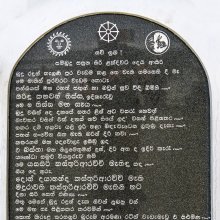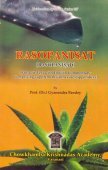Vaga, Vāgā: 10 definitions
Introduction:
Vaga means something in Hinduism, Sanskrit, Marathi, biology. If you want to know the exact meaning, history, etymology or English translation of this term then check out the descriptions on this page. Add your comment or reference to a book if you want to contribute to this summary article.
Images (photo gallery)
Biology (plants and animals)
Source: Wisdom Library: Local Names of Plants and DrugsVaga in the Malayalam language is the name of a plant identified with Albizia lebbeck Albizia lebbeck (L.)Benth. from the Mimosaceae (Touch-me-not) family. For the possible medicinal usage of vaga, you can check this page for potential sources and references, although be aware that any some or none of the side-effects may not be mentioned here, wether they be harmful or beneficial to health.
Source: Google Books: CRC World Dictionary (Regional names)1) Vaga in India is the name of a plant defined with Albizia lebbeck in various botanical sources. This page contains potential references in Ayurveda, modern medicine, and other folk traditions or local practices It has the synonym Inga borbonica Hassk. (among others).
2) Vaga is also identified with Albizia odoratissima It has the synonym Acacia lomatocarpa DC. (etc.).
3) Vaga is also identified with Albizia procera It has the synonym Mimosa coriaria Blanco (etc.).
Example references for further research on medicinal uses or toxicity (see latin names for full list):
· Chem. Pharm. Bull.
· Revisio Generum Plantarum (1891)
· Species Plantarum (1753)
· Journal of Natural Products (1998)
· Phytochemistry
· Research Journal of Medicinal Plant (2007)
If you are looking for specific details regarding Vaga, for example diet and recipes, side effects, health benefits, chemical composition, extract dosage, pregnancy safety, have a look at these references.

This sections includes definitions from the five kingdoms of living things: Animals, Plants, Fungi, Protists and Monera. It will include both the official binomial nomenclature (scientific names usually in Latin) as well as regional spellings and variants.
Languages of India and abroad
Marathi-English dictionary
Source: DDSA: The Molesworth Marathi and English Dictionaryvaga (वग).—f Countenance, favor, support, patronage (as of great people): also influence or prevalence with them, interest.
--- OR ---
vāga (वाग).—m (vāgaviṇēṃ) Susceptibility or suitableness of carriage or conveyance, carriableness. Ex. āṭha- kīcā vāga Adaptation or demand to be carried by eight; a load for eight. 2 m f (vāgaṇēṃ) Living or moving at, in, or amongst. See under vāgaṇūka.
Source: DDSA: The Aryabhusan school dictionary, Marathi-Englishvaga (वग).—f Countenance, favour. Influence, interest.
--- OR ---
vāga (वाग).—m Carriableness.
Marathi is an Indo-European language having over 70 million native speakers people in (predominantly) Maharashtra India. Marathi, like many other Indo-Aryan languages, evolved from early forms of Prakrit, which itself is a subset of Sanskrit, one of the most ancient languages of the world.
Sanskrit dictionary
Source: DDSA: The practical Sanskrit-English dictionaryVāgā (वागा).—A bridle.
Source: Cologne Digital Sanskrit Dictionaries: Edgerton Buddhist Hybrid Sanskrit DictionaryVaga (वग).—[, in Gaṇḍavyūha 105.22 sattva-vagasya, read sattvāva-gasya, and see avaga.]
Source: Cologne Digital Sanskrit Dictionaries: Shabda-Sagara Sanskrit-English DictionaryVāgā (वागा).—f.
(-gā) A bridle.
Source: Cologne Digital Sanskrit Dictionaries: Monier-Williams Sanskrit-English DictionaryVāgā (वागा):—f. a bridle, [cf. Lexicographers, esp. such as amarasiṃha, halāyudha, hemacandra, etc.] ([probably] [wrong reading] for valgā).
Source: Cologne Digital Sanskrit Dictionaries: Yates Sanskrit-English DictionaryVāgā (वागा):—(gā) 1. f. A bridle.
[Sanskrit to German]
Sanskrit, also spelled संस्कृतम् (saṃskṛtam), is an ancient language of India commonly seen as the grandmother of the Indo-European language family (even English!). Closely allied with Prakrit and Pali, Sanskrit is more exhaustive in both grammar and terms and has the most extensive collection of literature in the world, greatly surpassing its sister-languages Greek and Latin.
See also (Relevant definitions)
Starts with (+105): Vaga sian, Vagabarasa, Vagacavada, Vagada, Vagadambara, Vagadau-bhindo, Vagadevata, Vagadhipa, Vagadhishthatri, Vagadi, Vagadia, Vagadipitrya, Vagadisu, Vagadora, Vagadosha, Vagagocara, Vagaha, Vagahya, Vagai, Vagai maram.
Ends with (+132): Adhvaga, Ajbhavaga, Ajivaga, Ajivaga, Akavaka, Akkhevaga, Alavaga, Anubhavaga, Anuvvivaga, Anuvyavaga, Anvaga, Anvavaga, Apavaga, Aravaga, Arevaga, Arivarivaka, Asarvaga, Asvaga, Avaga, Avagavaga.
Full-text (+22): Vaaga-pushpam, Puli vaga, Vaga sian, Potta vaga, Urajhura, Vagapaharaka, Tarakiparakhi, Virivaka, Vagavashila, Nela-vaga, Oyyena, Kalaivakan, Kahya, Cikasha, Moympu, Cakkaravakam, Kaccuccattu, Avaga, Mu-kulipayccu, Erythropalum scandens.
Relevant text
Search found 5 books and stories containing Vaga, Vāga, Vāgā, Vaaga; (plurals include: Vagas, Vāgas, Vāgās, Vaagas). You can also click to the full overview containing English textual excerpts. Below are direct links for the most relevant articles:
Historical Elements in the Matsya Purana (by Chaitali Kadia)
Human History in the Purāṇa < [Chapter 3 - Historical elements in the Mahā-Purāṇas]
Sivaprakasam (Study in Bondage and Liberation) (by N. Veerappan)
Sat and Asat < [Chapter 3 - Understanding the Self]
Mahabharata (English) (by Kisari Mohan Ganguli)
Section LXV < [Sambhava Parva]
Shri Gaudiya Kanthahara (by Srila Bhaktisiddhanta Sarasvati)
The Religion and Philosophy of Tevaram (Thevaram) (by M. A. Dorai Rangaswamy)
Chapter 7 - Age of Nampi (Sundarar)—Examined < [Volume 1 - Nampi Arurar’s Tevaram (his life and age)]
Related products



